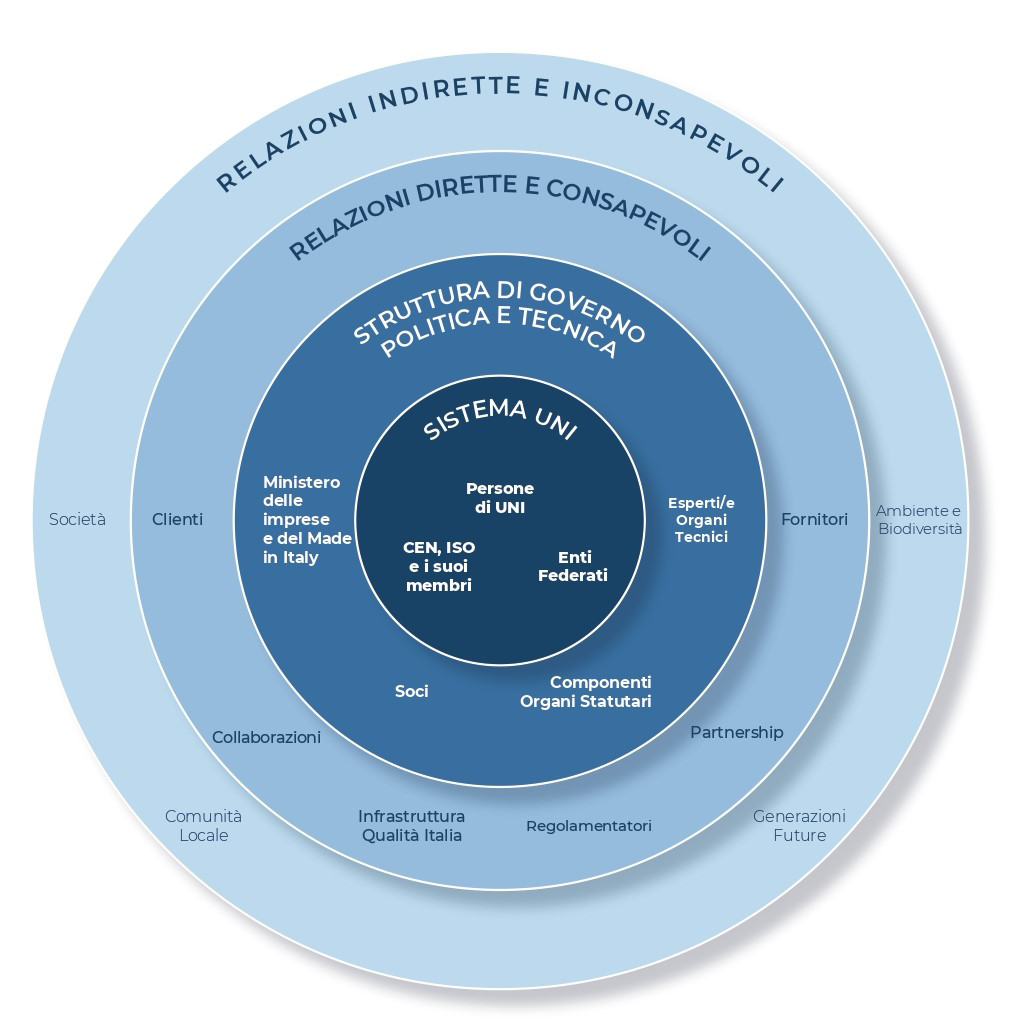
Mission and Values
Enhancing the centrality of standardisation by contributing to building a 'well made world'
Standards safeguard citizens, make companies more competitive, protect the environment and promote sustainability.
Standards support the legislator, because they always offer certain and shared references.
UNI draws up and publishes technical standards for all industrial commercial and tertiary sectors (excluding electrical and electrotechnical which are the responsibility of CEI – Comitato Elettrotecnico Italiano).
Technology
Standards reduce the economic and financial risk of research and development.
Competitiveness
Standards reduce business costs and time to market for products and services.
Protection
Standards protect citizens, as consumers and as workers, by setting quality and safety standards for products, processes, services.
Sustainability
The standards are designed without ever losing sight of the UN 2030 Agenda with its 17 goals.
Justice
Standards provide clear and agreed references to regulate new areas or to simplify existing regulation.

Our Stakeholders
UNI is a multistakeholder platform. Making a map of it reflects the complexity of the national standardisation system, as well as the articulation of its activities.
At the centre of it all are our People: the source of knowledge and skills that enable us to achieve all our goals.
One of the fundamental principles guiding standardisation is consensus. This is why we take into account the will and interests of all parties involved in the standardisation process: our function is to find shared solutions that meet the needs of all economic and social realities. And the systematic involvement of stakeholders is at the heart of our mission.
Stakeholders map
UNI SYSTEM
- UNI People
- Federated Bodies
- CEN, ISO and its Members
POLITICAL AND TECHNICAL GOVERNANCE STRUCTURE:
- Ministry of Enterprises and Made in Italy
- Representative Members (including Large Members), Ordinary Members, Members by right (Ministries, ACCREDIA, CNR)
- Components of Statutory Bodies (Chairperson, CIS, CD, GE, CCT, CCPPA, Legal Auditors, Arbitrators, Vigilance Body – OdV, CSN)
- Experts appointed by the members to the Technical Bodies (Chairpersons/Co-ordinators/Rapporteurs, CEN and ISO experts)
DIRECT AND CONSCIOUS RELATIONS:
- Customers (standards, subscriptions, UNITRAIN and other services)
- Dedicated collaborations (universities, consumers’ associations, UNI/PdR, special projects, Mark UNI, CEN/ISO Secretariats)
- Infrastructure for the Quality Italy (INRIM, CEI, ACCREDIA, Certification and/or Verification Bodies – OdC, Laboratories)
- Regulators, contracting stations
- Partnerships (EU-funded projects, research activities)
- Suppliers (banks, insurance companies, utilities, IT developers, media partners, UNITRAIN tutors) and consultants (accountant, lawyer, etc.)
INDIRECT AND UNCONSCIOUS RELATIONS:
- Society as a whole – Set of entities that do not have a direct relationship with UNI (citizens, consumers, professionals, civil society, enterprises, institutions, public administration)
- Future generations
- Local community (in the proximity of UNI offices)
- Environment (air, land, water) and Biodiversity

A toolbox to save
the world
To protect the environment and combat climate change, appropriate ‘tools’ are needed: in this toolbox, voluntary technical standards play a crucial role.
UNI, like all international standardisation bodies, is committed to orienting its activities towards the 17 Sustainable Development Goals of the UN 2030 Agenda.
At the same time we monitor and try to minimise our specific environmental impact, in our offices and internal activities, contributing, in our own small way, to a major global emergency.

“Affirming the Dignity of the Person and protect fundamental human rights”.
Our Statute says so, we put it into practice every day.
- Adopting as an ethical and deontological model of governance UNI EN ISO 26000 on social responsibility.
- Promoting health and safety at work, through an OSH Organisation and Management Model based on UNI/PdR 83:2020.

On the road towards inclusivity
Inclusiveness, not just in words, plays a fundamental role in our vision. Our goal is to value people highlighting differences and respecting competences.
In 2019, we signed the UNECE (Gender Responsive Standards Declaration).
We apply internally the UNI/PdR 125:2022 practice to make sure we are consistent and close any gaps.
We are part of Fondazione Libellula, a network of companies that aims to prevent and combat violence against women and gender discrimination.
Our commitment is summarised in a document:

We have a plan
We have created a cultural transformation plan in the company to inspire us as professionals and people. The goal is to always act and think ethically in every attitude, behaviour or decision.
Since 2017, we have been adopting the UNI ISO 26000 standard on the social responsibility of organisations as a model.
In parallel, practices UNI/PdR 18, UNI/PdR 21 and UNI/PdR 41 provide us with ethical guidance.
To be consistent with our CSR model, we have created an Integrity Infrastructure divided into 4 documents.
The Ethics Charter and Code of Ethics are our guide to guaranteeing well made things.
The Deontological Charter and Code of Deontology help us to prevent unacceptable behaviour, including describing some examples of violations.